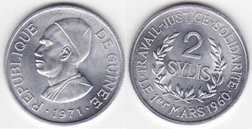Guinean syli
Appearance
| syli guinéen (French) | |
|---|---|
 2 sylis coin of 1971 | |
| ISO 4217 | |
| Code | GNS GNE |
| Denominations | |
| Subunit | |
| 1⁄100 | cauri |
| Banknotes | 1, 2, 5, 10, 25, 50, 100, 500 sylis |
| Coins | 50 cauris, 1, 2, 5 sylis |
| Demographics | |
| User(s) | Guinea |
| Issuance | |
| Central bank | Central Bank of the Republic of Guinea |
| Website | www |
| This infobox shows the latest status before this currency was rendered obsolete. | |
The syli was the currency of Guinea between 1971 and 1985. It was subdivided into 100 cauris. The Susu language|Sosso]] word syli means "elephant", while cauri refers to the shells formerly used as currency. The syli replaced the Guinean franc at a rate of 1 syli = 10 francs.
Coins of 50 cauris, 1, 2 and 5 sylis were made of aluminium. Banknotes of the 1971 series were issued in denominations of 10, 25, 50 and 100 sylis. A second series of banknotes was issued in 1980, this time in different colours and with four additional denominations – 1, 2, 5 and 500 sylis notes.
The syli was replaced by the franc guinéen in 1985 at par.
Banknotes
[edit]| 1971 notes | |||||
|---|---|---|---|---|---|
| Image | Value | Main Colour | Obverse | Reverse | Date of issue |
| [1] | 10 sylis | Brown | Patrice Lumumba | People with bananas | 1971 |
| [2] | 25 sylis | Dark brown | King Béhanzin of Dahomey | Man and cows | |
| [3] | 50 sylis | Green | Alpha Yaya Diallo (King of Labé) | Kinkon hydroelectric plant | |
| [4] | 100 sylis | Violet | Samori Ture | Steam shovel and two dump trucks | |
| 1980 notes | |||||
| [5] | 1 syli | Olive green | Mafory Bangoura | text "un syli" | 1980 |
| [6] | 2 sylis | Orange | King Mohammed V of Morocco | text "deux sylis" | |
| [7] | 5 sylis | Blue | Kwame Nkrumah | People with bananas | |
| [8] | 10 sylis | Red | Patrice Lumumba | People with bananas | |
| [9] | 25 sylis | Dark gren | King Behazin of Dahomey | Man and cows | |
| [10] | 50 sylis | Dark brown | Alpha Yaya Diallo (King of Labé) | Kinkon hydroelectric plant | |
| [11] | 100 sylis | Blue | Samori Ture | Steam shovel and two dump trucks | |
| [12] | 500 sylis | Dark brown | Josip Broz Tito | People's Palace, Conakry | |
| For table standards, see the banknote specification table. | |||||
References
[edit]Wikimedia Commons has media related to Money of Guinea.
- Guinea at Infotech 2003
